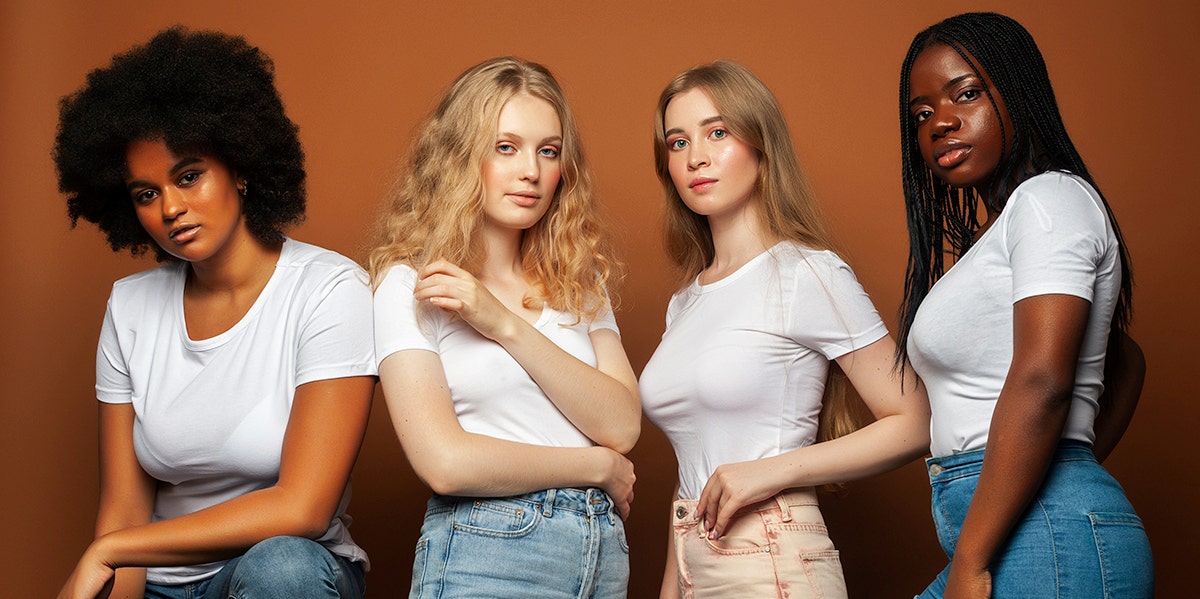How I've Learned To Confront My Female Internalized Misogyny
Women don't need to be pitted against other women.
 iordani / Shutterstock
iordani / Shutterstock What exactly does it mean to be catty?
Looking up the definition, it’s as stated: deliberately hurtful in one’s remarks; spiteful.
Growing up, I enjoyed watching movies like Mean Girls, which is a classic representation of girls being pitted against each other.
I enjoyed shows like Gossip Girl, where Blair Waldorf was everyone’s favorite, known for her conniving tendencies, usually against other girls in the show.
When I reflect on the type of media I consumed when I was growing up, I cringe at how many of the typical mean girl characters I enjoyed watching, and even wanted to be like.
RELATED: Remembering Ruth Bader Ginsburg, Supreme Court Justice And Feminist Icon, Dead At Age 87
All of those characters played such a part in the comments I would make towards other women.
Women have been consistently told “to be different.” We’ve been pitted against each other, and made to think that another’s woman's beauty, or success, somehow takes away from our own.
I’ve called myself a feminst for a very long time, and there are moments where I make passing comments in my head about other women, whether I know them personally or not, and immediately, I have this sense of guilt.
How can I call myself a feminist?
How can I be a woman myself and yet, here I am, making offensive and downright mean comments about another woman?
But it’s so common.
When talking about my internalized misogyny with my mother, or even my other friends who are women, we’ve all agreed that it’s an issue that stems from factors that run much deeper.
I’ve made comments in the past about women just to get male validation – a direct effect of the patriarchy.
It’s the patriarchal values that have been set up in this world. They’ve affected our culture, and the way we interact with each other.
But it’s not just the patriarchy, because women are at fault as well. We’ve been educated since birth to think, act, and feel in a certain way.
Women have managed to keep up these traditional social practices and norms, and acknowledging and confronting our internalized misogyny has to come from us.
We need to realize that other women's beauty and success only highlights our own.
The ultimate strength between our universal sisterhood — regardless of biology or sex — lies behind our ability to be incredibly vulnerable and compassionate.
There doesn’t need to be that stereotypical catty mean girl in every coming-of-age teenage story.
And we don’t have to imitate those characters in real life.
As someone who consumed this type of media, who would rewatch shows/movies like that, I quickly perpetuated the “I’m not like other girls” or mean girl mentality, and in a way, I prejudged women who had names like Amber or Tiffany, women who were blonde, or women who were popular in high school.
RELATED: I Dumped My Mean Girl Friends Like A Bad Habit. So Should You.
I turned my nose up at women who were sexually liberated, who dated around.
I would whisper about women who were any bit different then me, as if I were somehow the standard of a perfect girl.
And for so long, I didn’t know how to dismantle my way of thinking.
I didn’t know how to combat my internalized misogyny.
But I’ve come to realize that it’s simply neutrality.
It’s coming from a place of not spewing hatred, and also not allowing yourself to receive hatred. It’s okay to remove yourself from situations that are causing you pain. I’ve let go of so many girlfriends who were only adding to my own thoughts and insecurities that I would then plague onto other women.
It’s also taking some time to really look within and acknowledge all of the hurt that other women have caused.
I’ve filled pages and pages of my journal about situations I’ve been in where other women have hurt my feelings or caused me pain.
And it’s not just other women, but also society, media, our parents, and the values we’ve been taught since birth.
Once those wounds are finally acknowledged, the healing process can finally start.
Unkindness does not elicit more unkindness. It’s a cycle of internalized misogyny, of oppression, of discrimination.
By me accepting my deep wounding and my own hurt, and just understanding how huge this ecosystem of ideologies and beliefs put into place really are, it was only then that I was able to realize that none of it was my own fault.
And it was only then that I could truly see other women as my sisters and my allies, not my competition.
Nia Tipton is a writer living in Chicago. She covers pop culture, social justice issues, and trending topics. Follow her on Instagram.

